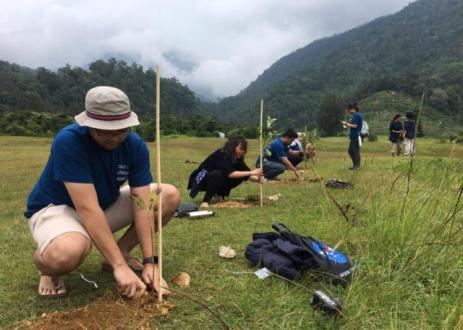Aplikasi Nol Emisi Indonesia (EMISI): Metode Penghitungan Emisi Individu dari Penghantaran Barang serta Transportasi Laut dan Udara
Ringkasan
Catatan Teknis ini memaparkan metode yang digunakan dalam aplikasi EMISI untuk menghitung emisi gas rumah kaca dan polutan udara di tingkat individual yang berasal dari kegiatan penghantaran barang serta transportasi laut dan udara.
Ringkasan Utama
Untuk sementara publikasi ini hanya tersedia dalam Bahasa Inggris.
Human activities can contribute to the production of greenhouse gas (GHG) emissions and air pollutants, thus exacerbating the impact of the climate crisis. The Indonesia Zero Emissions Application (EMISI) was developed in 2020 to help the public and organizations easily calculate and track emissions associated with land transportation activity in Indonesia. The WRI Indonesia team had produced a technical note to extend EMISI platform’s calculator to calculate household emissions. Now, the team has extended the platform to calculate the emissions generated from goods deliveries, and marine, and aviation transportation.
More than 50 percent (2018) of transport emissions came from aviation, marine, and road-freight transport (Ritchie 2020), more attention should be given to this sector, especially in an archipelagic country such as Indonesia, where both aviation and marine-based transportation plays a vital role. Additionally, though the government has set up initiatives to accelerate the electrification of the transport sector, aviation, marine, and road freight are difficult to decarbonize and electrify and therefore other efforts to reduce or mitigate emissions from these sectors are important.
This technical note focuses on calculating methane (CH4) and CO2 as GHG emissions, followed by carbon monoxide (CO), nitrogen oxides (NOx), fine particulate matter (PM2.5, meaning particulate matter with diameter less than 2.5 micrometers), sulfur dioxide (SO2), and nonmethane volatile organic compounds (NMVOCs) as air pollutants, considering their substantial implications for climate change and air pollution. Consequently, further adjustments to methodologies of the Intergovernmental Panel on Climate Change (IPCC) are made by adopting Indonesia-specific emission factors, coefficients, and assumptions from best available government data (Ministry of Energy and Mineral Resource Indonesia 2017; Ministry of Environment and Forestry Indonesia 2017; 2010), with complementary international sources (ICAO 2016; Olmer et al. 2017; United Nations 2020).
Materi Tambahan
Proyek

Emission Reduction and Sequestration Initiative/Inisiatif Pengurangan dan Penyerapan Emisi (EMISI)
Kunjungi ProyekPlatform buatan Indonesia yang bisa membantu semua orang untuk mempelajari, memantau, dan ikut serta dalam aksi iklim.
Bagian dari Iklim
